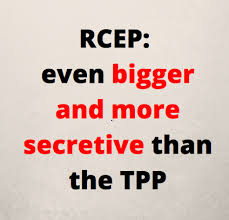Law professors address RCEP negotiators on copyright

Electronic Frontier Foundation |24 February 2017
Law professors address RCEP negotiators on copyright
Next week the latest round of secret negotiations of the Regional Comprehensive Economic Partnership (RCEP) kicks off in Kobe, Japan. Once the shy younger sibling of the Trans-Pacific Partnership (TPP), the recent death of the TPP has thrust RCEP further into the spotlight, and raised the stakes both for its sixteen prospective parties, and for lobbyists with designs to stamp their own mark on the text’s intellectual property and e-commerce chapters.
Our last analysis of RCEP pointed out some of the ways in which the then-current leaked text represented an improvement on the TPP, but how other parts of it—including those on copyright enforcement—repeated its mistakes and failed to seize opportunities for improvement. This week, over 60 copyright scholars released an open letter that sets out their views of what negotiators ought to do in order to address these problems. The letter begins:
We are deeply concerned about the copyright protection standards proposed for the RCEP IP Chapter. They may cause unintended effects of stifling creativity, free speech, and economic growth. We urge that the new rounds of RCEP negotiations reconsider those standards by applying the following three principles:
1. Integrate the public interest as a core value for copyright negotiations.
2. Increase transparency of negotiations for the public interest.
3. Institute changes in copyright provisions for the public interest.
Guided by these three principles, RCEP negotiations would produce the largest mega-regional free trade agreement to procedurally and substantially protect the public interest in copyrighted works. The RCEP copyright provisions, therefore, stand to benefit nearly 50% of the world’s population, who live in the sixteen RCEP participating countries.
While EFF’s position is that copyright doesn’t belong in trade agreements at all, we have acknowledged that copyright lobbyists aren’t going to stop seeking their inclusion in such agreements any time soon. We have also recommended some improvements to the processes of trade negotiation that would make them more transparent and inclusive, and therefore more democratically legitimate. Although our recommendations were directed to the U.S. Trade Representative (which is not a party to the RCEP negotiations), the law professors’ letter echoes the spirit of some of them. In particular, the professors argue:
Release negotiation information: The RCEP should take affirmative measures to make all negotiating texts and other relevant documents publicly available as soon as possible. For this purpose, the RCEP should learn from the example of the World Intellectual Property Organization (WIPO), which carried out transparency measures that facilitated the successful conclusion of the Marrakesh Treaty to Facilitate Access to Published Works for Persons Who Are Blind, Visually Impaired or Otherwise Print Disabled. WIPO publicly released draft negotiating documents promptly. It also publicly webcast the negotiating process.
Strengthen stakeholder engagement: When considering critical issues, the RCEP should open up channels through which the relevant stakeholders can submit their opinions. Stakeholders may include not only business groups but also civil society representatives. When necessary, the RCEP should organize public hearing meetings where various stakeholders can discuss the merits and demerits of draft proposals and negotiators can explain decision-making processes.
Beyond these procedural suggestions, the law professors also put forward some substantive ideas about how copyright could be dealt with in a more balanced way. Although stopping short of proposing a mandatory "fair use" provision, they do propose that parties should form "a committee consisting of negotiators and copyright experts should be set up to identify myriad public interests in using copyrighted works in RCEP participating countries," and should "endeavor to craft provisions to protect the public interest primarily by carving out limitations and exceptions to copyright and setting up a safe harbor system for Internet service providers."
Given the closed-door nature of the negotiations, it is difficult to discern what impact these demands will have. One of the few signs of any improvement came with Japan’s announcement yesterday that it would be holding a stakeholder engagement event during this round of negotiations—but, as the announcement came only three days in advance of the event, it came too late for most international delegates to arrange to be present. The RCEP negotiators evidently haven’t taken the failure of the TPP to heart, or they would be doing more to ensure that their negotiations are inclusive, transparent, and strike a fair balance between the interests of copyright owners and those of the public.





